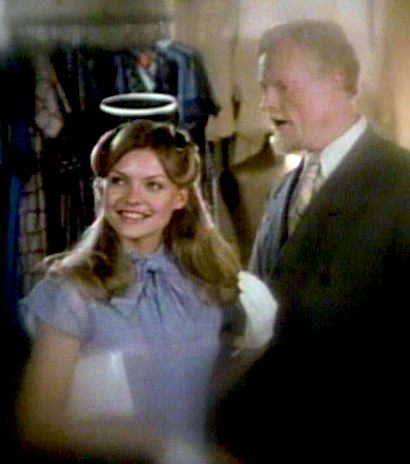 Pfeiffer instantly sentimentalized, with a halo no less, in her first scene in "Falling in Love Again"P F A N D O M
Pfeiffer instantly sentimentalized, with a halo no less, in her first scene in "Falling in Love Again"P F A N D O M
Michelle Pfeiffer Retrospective. Episode 7
by Nathaniel R
There are an infinite number of worse people to grow up to look like than British star Susannah York but somehow it's hard to buy that that's who Michelle Pfeiffer would become. Pfeiffer was still a pre-teen when Susannah York hit her career peak, most notably in a string of erotically charged and sometimes controversial 1960s movies like Tom Jones, The Killing of Sister George, X Y and Zee, and They Shoot Horses Don't They (the latter brought her her only, but well deserved, Oscar nomination). By the time Pfeiffer was hitting the movies and cast to play York as a young girl, York's star was fading. York had recently been reduced to a merely decorative alien maternal presence in Superman (1978) and now a young actress was playing the idealized version of her. Hollywood can be cruel that way.
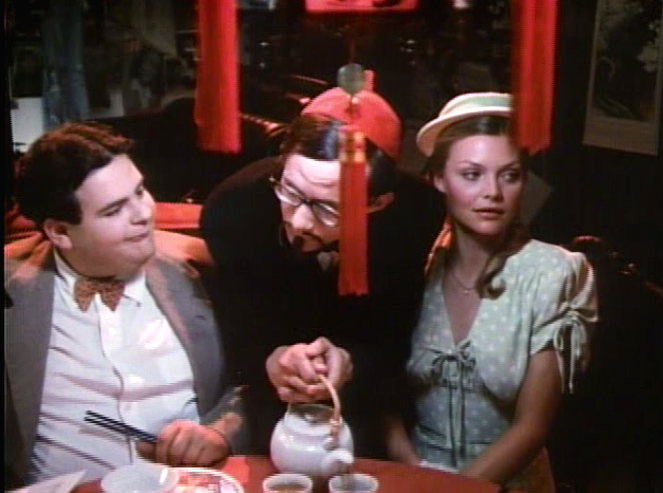 Lured to a Chinese restaurant under false pretenses, Sue thinks she's going to a war charity effort. But it's a date instead
Lured to a Chinese restaurant under false pretenses, Sue thinks she's going to a war charity effort. But it's a date instead
Falling in Love Again (1980)
In this treacly misfire, middle aged Harry (Elliot Gould) is unhappy with his life and his wife Sue (York), but spends a lot of time fantasizing about her younger self. Enter Pfeiffer to play his memory of her; When he recalls the first time he saw his wife, this memory even comes with a halo over her head. Consider that a strange example of the film's weird and uneven sense of humor.
Harry is just a Bronx street kid whose father works at a dress shop where she's the boss's daughter. His friends warn him away from her.
Better you should fall in love with Rita Hayworth. Pick someone you have a chance with!
Despite being Pfeiffer's second film to hit theaters (Hollywood Knights had premiered some six months earlier), I suspect it was actually the first theatrical feature she shot. That would explain the "introducing" credit that's usually reserved for film debuts. It would also explain this rather questionable performance with dodgy high school play English accent and stiff body language. As we saw in the last slightly out of sequence episode, by the end of 1981 and a series of telefilms she seemed to have thoroughly vanquished any nerves she had about acting. She may have still felt them of course but by the end of '81 they weren't remotely visible to the camera.
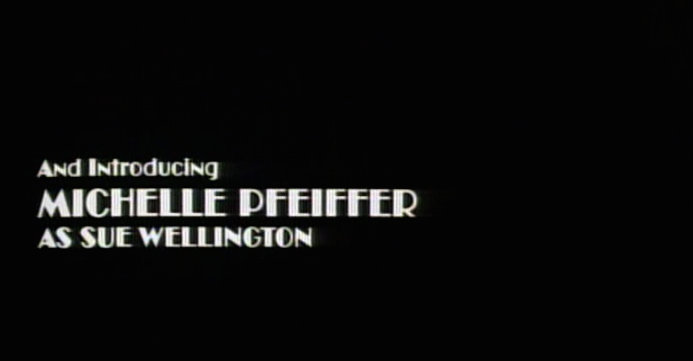
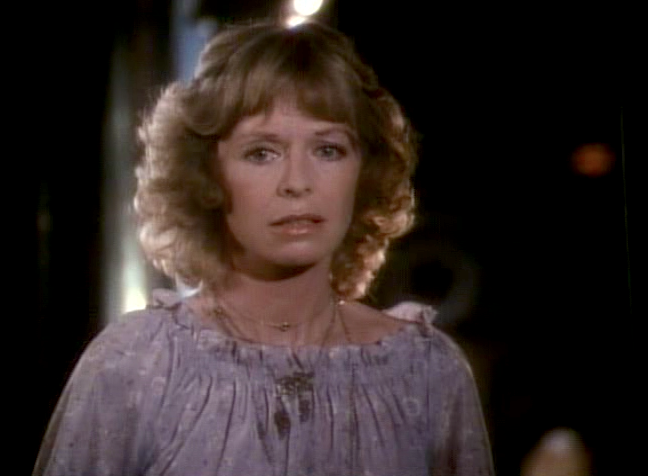 Falling in Love Again's highly questionable gender politics lay the blame for a cooling marriage on the neglectful career-oriented wife, played by Susannah York
Falling in Love Again's highly questionable gender politics lay the blame for a cooling marriage on the neglectful career-oriented wife, played by Susannah York
Many of Pfeiffer's scenes in the movie reduce her to aspirational love object (the film only sees her through Gould's perspective) which is perhaps for the best given the performance.
Still, for all the films weaknesses and Pfeiffer's own amateurishness in the role, that face is still that face. In retrospect at least, with hindsight being 20/20, it's impossible not to see her immense future as one of the great screen beauties, or notice the erotic power of that structurally exquisite face in her final scene as the young couple go to bed as newlyweds.
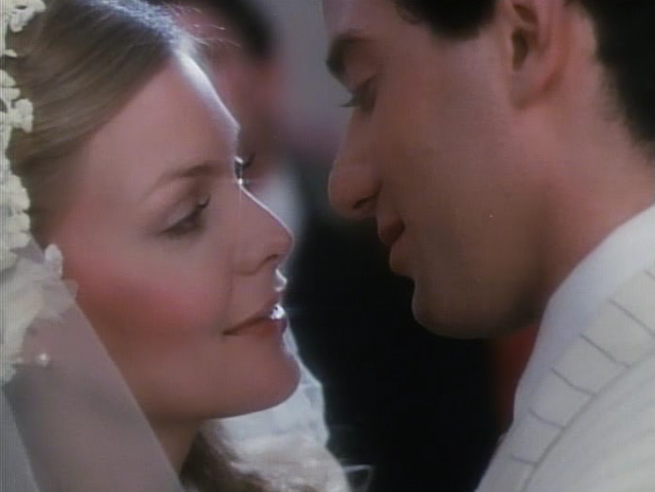
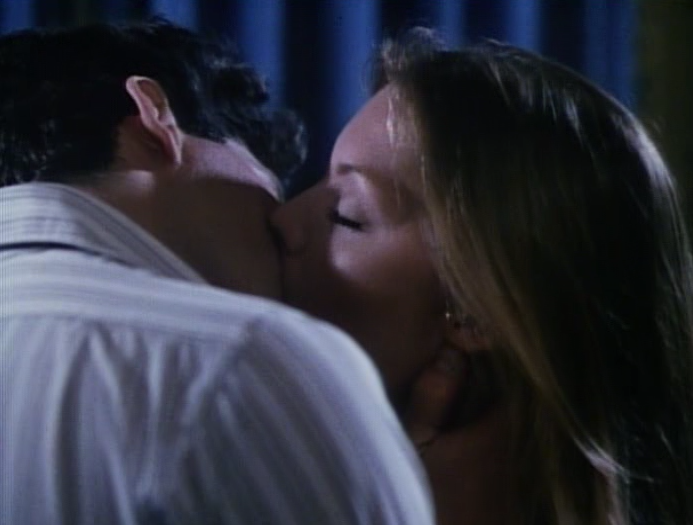
Just a few months after the release of Falling in Love Again she was back in theaters in a film she obviously shot a few projects later. But, how's this for strange and embarrassing trivia connections: Pfeiffer's last scene in both films is her wedding to the leading man and in both movies Pfeiffer goes to Chinese restaurants with white actors pretending to be Asians!
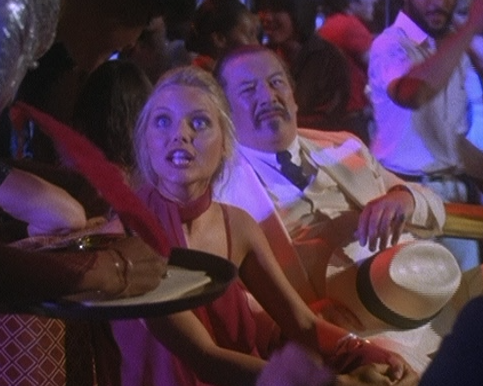 She'll have a Shirley Temple, straight up
She'll have a Shirley Temple, straight up
Charlie Chan and the Curse of the Dragon Queen (1981)
This was the slapstick end of a very long running franchise which had been around since the silents. Slapstick was of course also a dying form by the 1980s. Charlie Chan, an Asian Sherlock Holmes essentially, was initially played by Asian actors in silent films but starting in the early 30s the practice became "yellowface," in which white actors would pretend to be the great Asian detective. In the last film featuring the character the two time Oscar winning Britsh actor Peter Ustinov played Chan while American hunk Richard Hatch played his half Chinese / half Jewish grandson Lee. Making the yellowface practice yet more aggravating is that the film is peppered with actual Asian actors in every single one of the small Asian roles.
 For all its instantly dated racial politics, the film is an interesting curio for the sheer volume of stars trying their hand at slapstick comedy: Lee Grant, Angie Dickinson (as the Dragon Queen), Rachel Roberts, Peter Ustinov, Brian Keith, and Roddy McDowall are all on hand to make willing fools of themselves in the film's elaborate and sometimes excruciatingly forced comedy; Lee Grant, who plays Lee Chan's grandmother (her daughter had married Charlie Chan's son in the plotty prologue) and Rachel Roberts (her cook) fare best, occasionally wringing real laughs from the material.
For all its instantly dated racial politics, the film is an interesting curio for the sheer volume of stars trying their hand at slapstick comedy: Lee Grant, Angie Dickinson (as the Dragon Queen), Rachel Roberts, Peter Ustinov, Brian Keith, and Roddy McDowall are all on hand to make willing fools of themselves in the film's elaborate and sometimes excruciatingly forced comedy; Lee Grant, who plays Lee Chan's grandmother (her daughter had married Charlie Chan's son in the plotty prologue) and Rachel Roberts (her cook) fare best, occasionally wringing real laughs from the material.
Richard Hatch and Michelle Pfeiffer were the only "rising" stars of the time in the mix. Hatch was fresh off of TV's Battlestar Galactica and trying (briefly) to become a film star before retreating to series work again and Michelle Pfeiffer was the brand new but already frequently cast face in town (see the first six episodes in this retrospective). Hatch's character wants to be a great detective like his grandfather but is clueless, inept and clumsy. He often causes great havoc in the populated street scenes. The stuntmen in Hollywood at the time surely appreciated the abundant paychecks! Pfeiffer is his devoted, equally dim, and exuberant fiancée Cordelia who totally believes in his potential despite no evidence to support that conclusion.
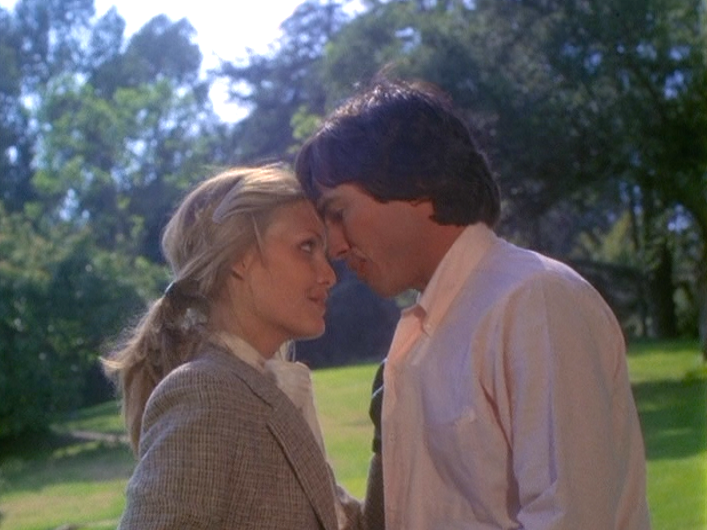
I don't want bright, confident men. I want you."
Her very first scene has her falling off a horse, rolling down a hill with Hatch, and absentmindedly picking crushed flower petals from her mouth after the mishap.
Though Pfeiffer is in a lot of the movie (most of the scenes feature various combinations of the characters -- think Clue's ensemble hijinkx without as many laughs) it's not much of a role. But it did gave the young actress an opportunity to get silly and try her hand at physical comedy (a new experience). She surely got a bit banged up in the process as she and Hatch are always falling all over themselves, each other, and into furniture or other people.
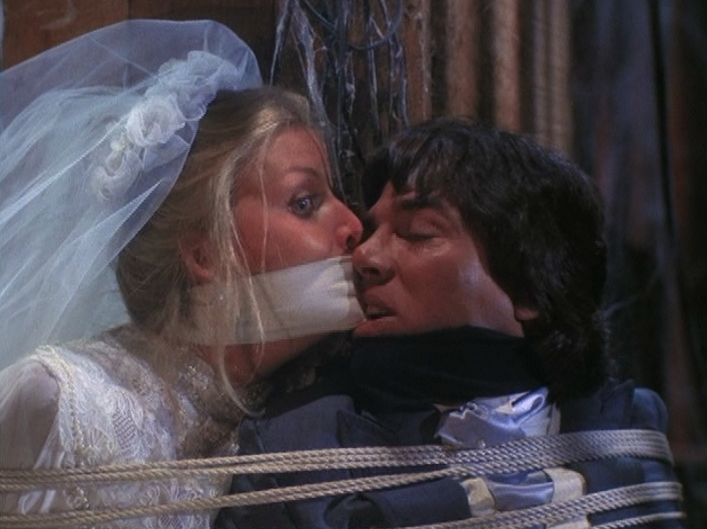 They make a gorgeous if dim-witted couple
They make a gorgeous if dim-witted couple
Perhaps it was good practice for the absurd task just ahead of her. Next time she went before cameras she'd be leading Pink Ladies in bowling alley sex songs and obsessing over cool riders in skin tight leather.

Last Week: Good Girl / Bad Girl in two TV movies (1981)
Next Saturday: Grease 2 (1982)... Pfeiffer's first lead in a movie!